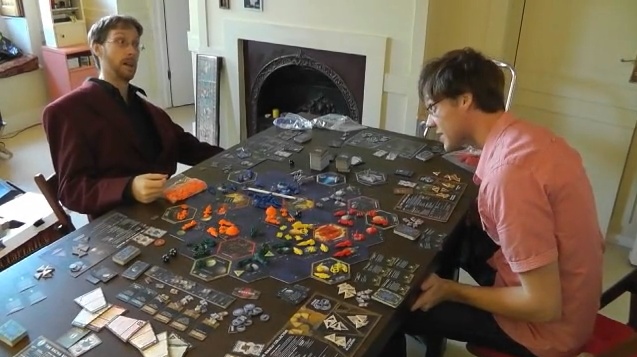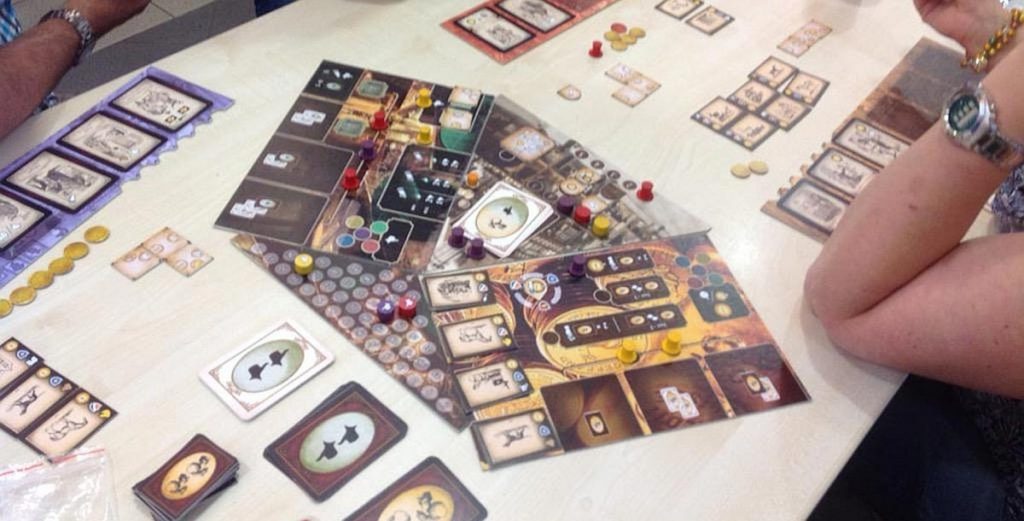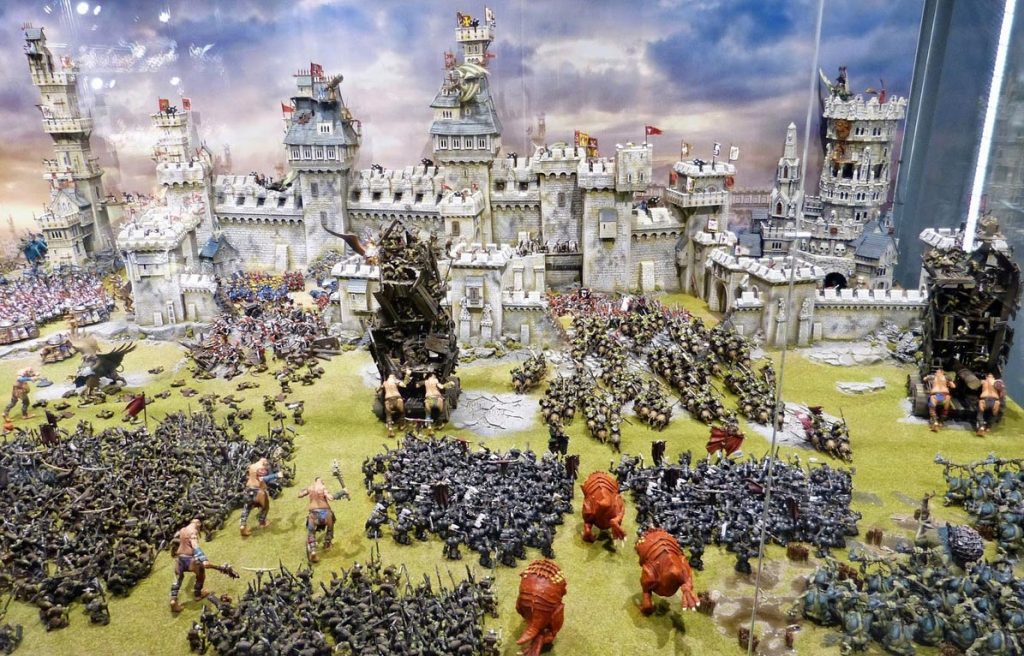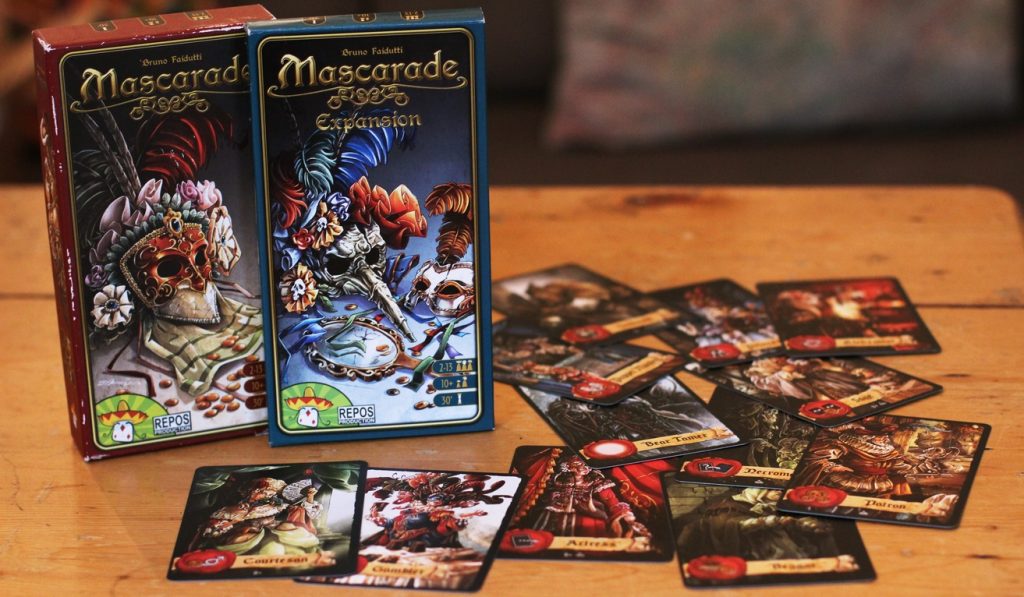Quinns: As we continue our marathon-like jog through Board Game Geek’s top 100 games ever, today I can reveal that we’re out of the weeds. We’ve played every single board game in the 60-41 slot!
Which isn’t to say that we always enjoyed ourselves…
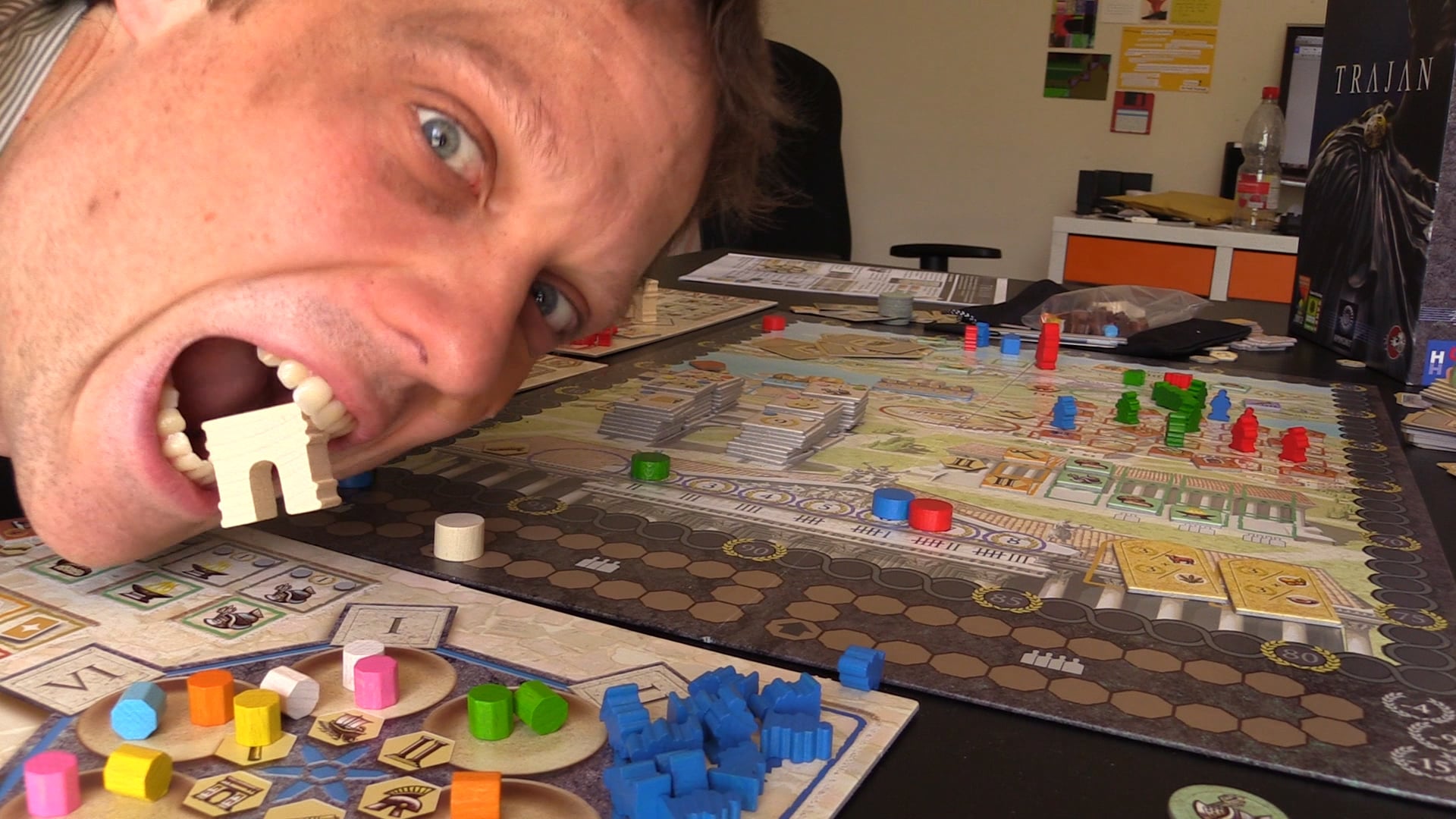
#60: TRAJAN
Review here
Quinns: Oh my god! In the below quote from my Trajan review we learn that at the time I wrote it, Trajan was Board Game Geek’s 38th best game ever. That means Trajan has fallen 22 places in exactly 22 months. BGG users sure like shiny new games, don’t they? I’d agree that truly phenomenal board games tend to come out about once a month, but I don’t know all of said games are “top 50 board games ever” good.
Paul: Wait, it has? Is this because more games were rated higher since, or because a significant number of users are re-rating or re-appraising games? Maybe I was wrong about that. Are YOU a Trajan re-rater? If so, please get in touch!
What we said:
Quinns: I described this game as a greatest hits album, and what I mean by that is that is that it’s technically proficient and plenty of fun, but it’s also a band at its most boring. Of course this is the 38th best board game ever. It’s perfect. There are no flaws at all. But here’s the thing. If you’re removing my friends from my board game night, you better be offering something at least as magical in return. You know what board game has remained on my shelves? Village. Because it tells this alternately maudlin and hilarious story. Tzolk’in, because its gears (this game has actual plastic gears) are so weird and interesting and tactile.
It’s fitting that Trajan’s colours are grey and white, and it’s fitting that the face on the front isn’t even alive. This game is immaculate and it has. No. Heart.
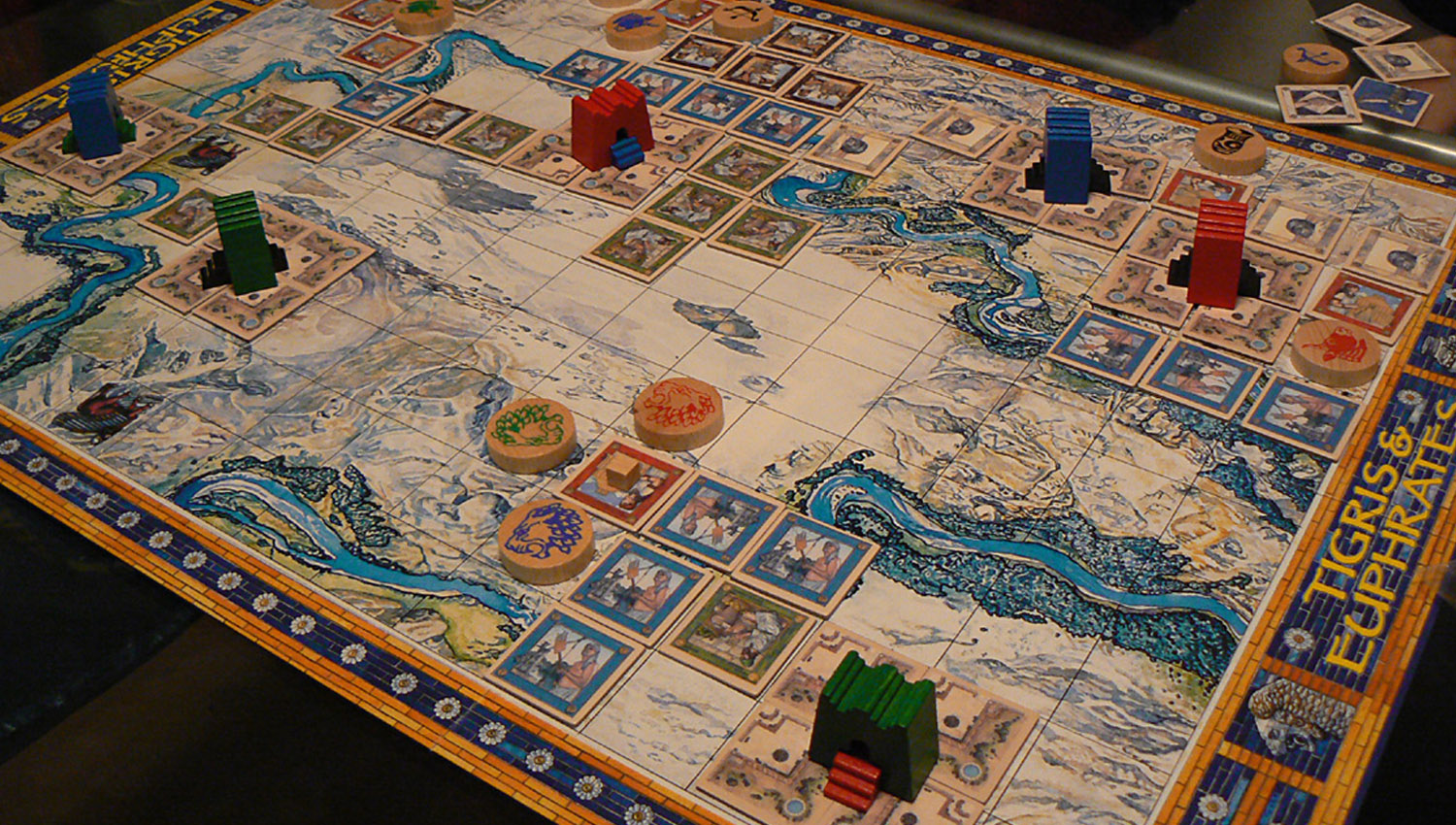
#59: TIGRIS & EUPHRATES
Quinns: We reviewed Samurai and we reviewed (and loved) Ra, which makes me think we should do a proper review of Tigris & Euphrates, the third Reiner Knizia classic that was recently touched up and re-released by prestigious studio Windrider Games. There’s just one obstacle in my way when it comes to rounding off this trio, which is that I played a tattered copy of Tigris & Euphrates once, many years ago now, and I remember almost nothing about the game except that I had a middling time.
Basically I am haunted by a sort of mediocre ludological phantom. I either need to play the damn thing again, or hire a professional exorcist. I just don’t know which.
What I said in a Games News once:
Quinns: I’ve played Tigris & Euphrates. The short version of that story is that, like a lot of Reiner Knizia games, it made me wish I was outside climbing a tree. The even shorter version is that it’s pretty good, if you like that kind of thing (read: tiles, Mesopotamians).
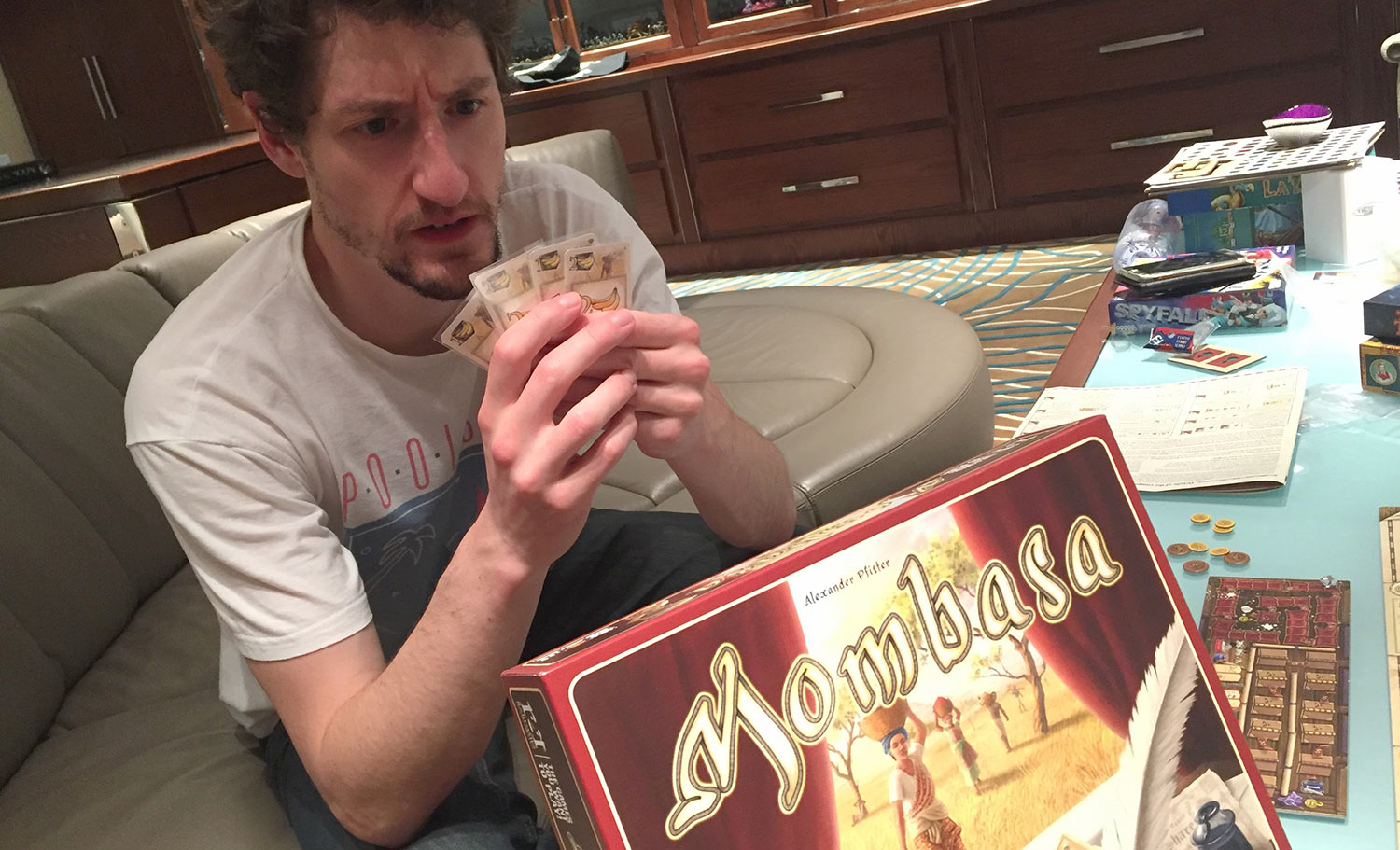
#58: MOMBASA
Review here
Matt: I can see why this one was so popular, it’s an odd and fiddly beast. I enjoyed myself with it quite a lot initially, but it wasn’t long before it started to feel like the game-design equivalent of a flashy fairground. So many rides! So many options! So many systems, and things to do! In reality though it just lacks bite. It’s a good game, but – for our money – not a great one.
What we said:
Quinns: I definitely didn’t like how disconnected the mechanics are. Let’s compare it to Concordia, which is still in my head from our review a couple of weeks ago. Every different action you can take in Concordia drastically affects anything else you might do, creating a complete ecosystem. You make a choice, and that choice will kill and create choices for everybody else.
Mombasa lacks any of that elegance. Whether you buy stocks in a company, acquire diamonds or slide up the bookkeeping track, you’ve simply scored an arbitrary amount of points in that subsect of the game, with no impact on other areas of the board. It’s a humongously complicated puzzle because there are so many teeny factors to take into account, but the downside is that instead of thinking, as you would in a more elegant game, you’re reading the board, adding, comparing. You’re hacking your way through a jungle of itty-bitty benefits instead of being absorbed by theme and colour. And while Mombasa’s fine print might be fitting for a game about bookkeeping, it’s not ideal for a game, full stop.
Matt: I agree with that. I do like the fact that this myriad of occasionally-connecting systems allow players to play Mombasa casually (focusing on diamonds and cards), or shoot for something tougher (like bookkeeping and gaining card slots), but you’re right that there’s little sense of anything tying together – the only time where the theme and mechanics really merge is when you’re messing with other people’s stock-prices by knocking key outposts off the map.
I also really liked the forward-planning nonsense of having to manage multiple tiny discard piles that would then form the hand of cards you’d have to use later, but despite the mash of cool ideas there’s little elegance in tying these systems together. It’s not a bad game by any means, but the diamonds and bananas never extend beyond comedy – there’s no sense of theme or role, just things you move around to manipulate systems.
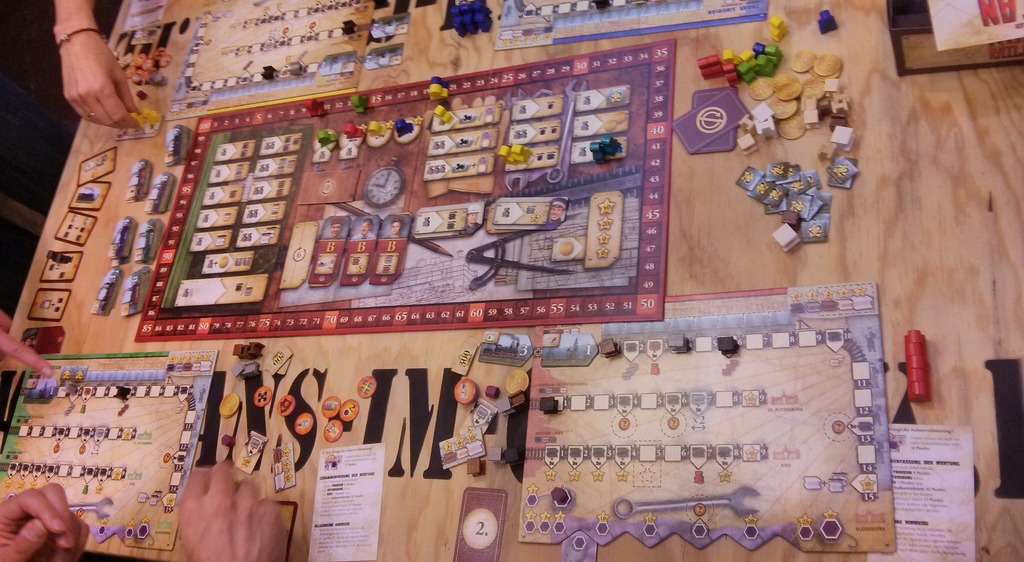
#57: RUSSIAN RAILROADS
Review here – Matt’s first Eurogame!
Matt: Well if it isn’t Steven Trains back in town, choo-choo-chewing up the furniture and making a mess. Oh but because it’s a train no-one minds, it’s OK. Board Game Geek turning a blind eye to trains like this is frankly disgusting. This is clearly a grand old time for those who love their number-heavy Euros, but wasn’t quite the right fit for Shut Up & Sit Down’s enigmatic tastes.
What we said:
Quinns: Now I think about it, most Eurogames let you build something more tangible. A stone age tribe, a cave network, a city, a business. It’s like a cushion, something to soften the puzzle if you’re not winning. At least you built a nice thing! Russian Railroads isn’t really about building anything. You’re spending two hours manufacturing a railroad spike from multipliers and wit and trying to drive it through the game / your friends’ egos.
Matt: The thing was, I thought it very much felt like a game about railroads, and steam trains. The acceleration of the game fit that, but mostly it felt like we were stuck on a course. It’s a game that very much felt like you had to have a strong direction quickly – changing strategies halfway through the game felt like an almost impossible task. I didn’t realise it at the time but I’d effectively built a track that led straight into a brick wall. By the time I’d worked it out, the pace of the game was too fast to do anything to correct that.
I did enjoy myself – I just think I would have enjoyed myself more if I’d brought a calculator. And when I find myself thinking things like that, I start to question whether or not I’m playing the right game. Up until that point I was having a lot of fun, and I think if you’re someone who doesn’t struggle with that stuff you’d probably have a bloody good time. Personally though my brain rebelled against it, knocked over the chalkboard, and started eating crayons.
Quinns: You know what? I bet the people who should buy this game will feel it in their… the maths part of their brain.
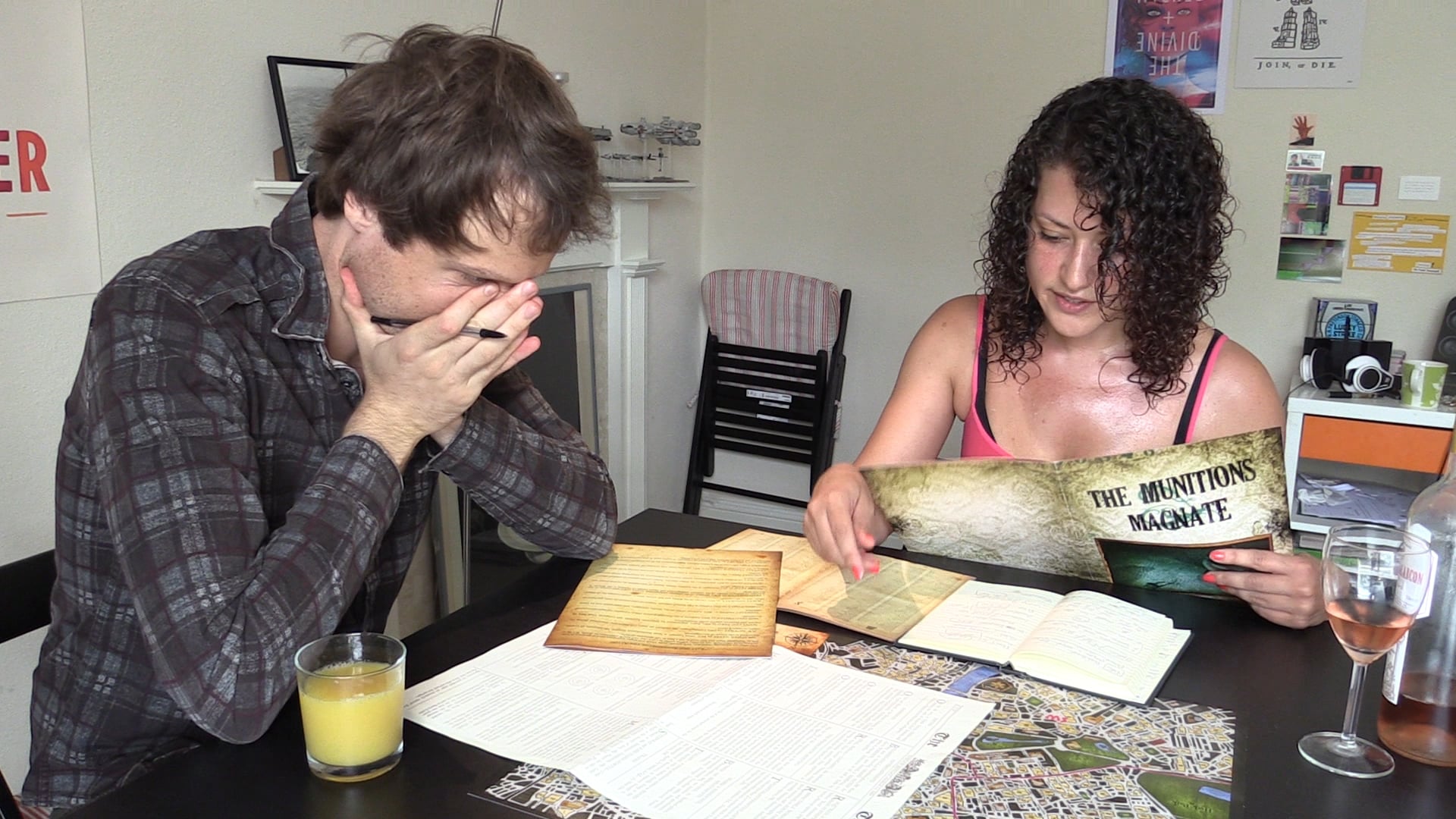
#56: SHERLOCK HOLMES CONSULTING DETECTIVE ![]()
Review here and review of this year’s expansion here
Quinns: So I’ve got this theory. Long-term SU&SD fans might remember that our 2014 review of this 1981 puzzle game caused it to sell out, temporarily driving up global demand to crazy levels. Since then, I think that the fancy new editions of Consulting Detective, the expansions, and other designers trying to get in on the action with games like Detective: A Modern Crime Story and Mythos Tales might be entirely down to SU&SD reviving this old design like the shock from a defibrillator.
I guess I could send an email to my friends as Asmodee and find out, but ever the amateur detective, I’m much more comfortable with this being a silly hypothesis.
Paul: HOW DEEP DOES THE RABBIT HOLE GO? I’m so glad the world gets more SHCD, as well as more titles inspired by it. It’s genius in how simple it is to play, yet how challenging it can be to solve. I know creating cases isn’t easy, but please, game designers of the world, give us more of this sort of thing!
What we said:
Quinns: This is the best game for couples and the best solo game ever made. After two decades of watching Poirot, Jonathan Creek, The Girl With the Dragon Tattoo, and remake after remake of Sherlock, Consulting Detective finally scratched the itch that I had to be a detective and solve a case. For the first time in my life, here’s a story that was interested in giving me a level playing field. You’re not meant to solve it or not solve the crime. It just… exists. The murder exists. The solution exists. London exists.

#55: DOMINION ![]()
Review here
Quinns: Paul, do you remember the time where we thought that the best way to review popular card game Dominion involved cutting up a t-shirt and filming you upside-down, covered in limes?
Paul: So, brief interlude here. After six years of working with you (and I treasure that, I really do!) there are entire videos I now barely remember shooting. This, however, I do remember. I may well remember it to my grave. Look what you made me do, Quintin. Also, Dominion is still very good after all these years. The end.
What we said:
Paul: This really is a smart game. It’s easy to learn, it’s without ambiguities, it’s effortless to play and it has so many possibilities. Limes.
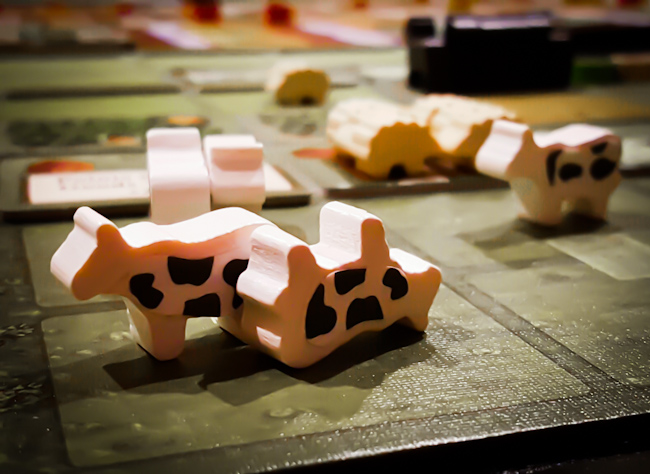
#54: FIELDS OF ARLE
Mentioned here
Paul: Shock, horror, I actually have this on my table RIGHT NOW, sprawled in all direction, scores of open fields, dozens of discarded cows. You know what? I like it. I’m not sure yet exactly how much I like it, though I can tell you it doesn’t supplant A Feast for Odin in my affections. It may even end up being the Uwe Rosenberg game that I like the least, though that’s like me saying “The free chocolate dessert I like the least.” This huge farmer’s toybox is so much fun, a real indulgence and perhaps an acquired taste, yet still something I’m always willing to gorge myself on.
What we said:
Paul: Watch this space! Well, not this actual space. But keep your eyes peeled. Well, not actually peeled. The point is my review is almost here.
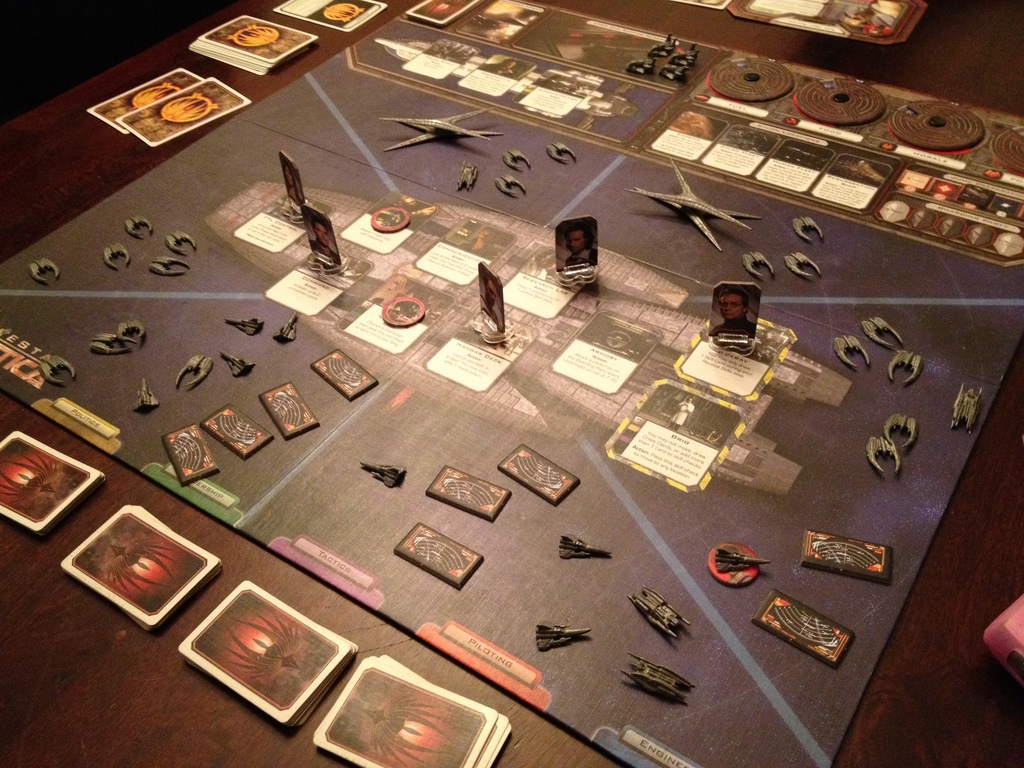
#53: BATTLESTAR GALACTICA
Matt: As someone who ADORED Battlestar Galactica before the fascinating plot arcs swooped their way into the bin, I’ve got a real place in my heart for this game. Physically moving around the ships is fun, as is going out into space and blasting up the lil’ shippers! Pow! Pow pow! You know what isn’t a lot of fun though? Finding out that all your friends are awful liars. So many of the mechanics in this game are just perfect – I really love the waves of stress that build up prior to every FTL jump, I love that some games will see you battered by Cylon fleets for almost the whole game, while others end up suspiciously quiet – merely leaving room for the seeds of mistrust to sprout into a fully-fledged Hedge of Paranoia.
But much as with Game of Thrones in the last part of the list, I feel it isn’t quite as strong overall as the hive mind would suggest. I’d love to see a reworked version with more elegant mechanics and a more modern design – having so much of the text required to play the game written in a tiny font in the middle of the board often underneath player character markers is just such poor design for a game with a central traitor mechanic. I’ve had great times with it, but I’d love to like it more – I’d definitely question its status as a classic.
Quinns: Me too. Honestly, there are so many ideas in this game that are so exciting (PRISON! THE PRESIDENCY! DOGFIGHTING! NUKES!), but these days the game, together with the TV series, has lost some of that zest and glitter*. Today, I think I’d be more interested in playing Shadows Over Camelot. The original, simpler, and smoother co-op game where Someone Is Secretly A Twat.
*Yes, it’s a sparkly lemon, ok?
Paul: I tell you what, though. The moment they announce a new edition of this I will be SO VERY INTERESTED.
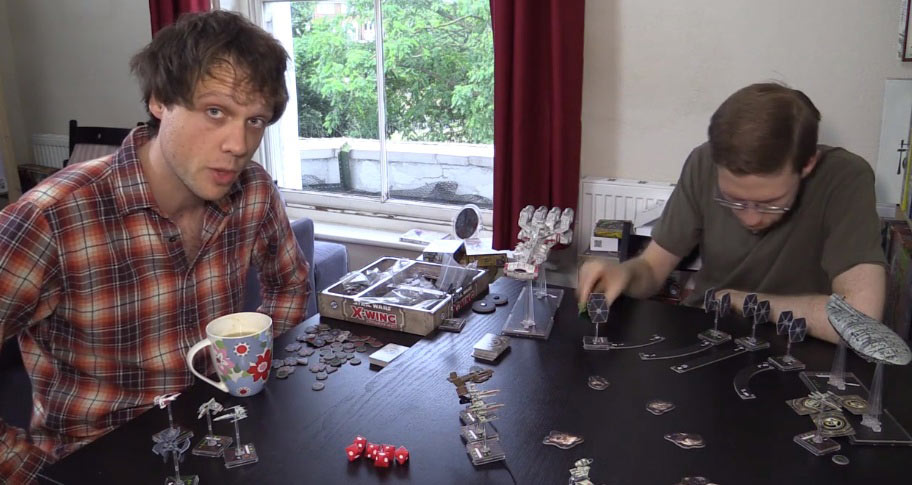
#52: STAR WARS: X-WING MINIATURES GAME ![]()
Matt: It’s interesting looking back at this one now, after seeing the juggernaut that X-Wing has become. After more waves than the pacific ocean it’s hard in some ways to identify where the game ends and where the terrifyingly expensive hobby begins. Still, thunderous IP-support aside, X-Wing remains a very fun little game – although it’s slightly odd not to see Star Wars: Armada making an appearance on this list. It had plastic stacky-disc things and a real space potato! I mean, hello?
Quinns: Ooh, I love a bit of Armada. I guess it’s worth remembering that a game’s BGG rank is determined not just by its average user rating, but by the number of users who rate it. I love Armada, but it has just a sixth of the votes that X-Wing does and that puts it at rank #155.
Paul: I think I’d pick Armada over X-Wing also, but I respect the pace of this. And all those poor, stressed little pilots.
What we said:
Quinns: Star Wars: X-Wing Miniatures Game is a bit expensive and a bit amazing, making it a mercenary Han Solo of a game- you love it, and it knows it, but really it just wants your money, and it’s going to be snatching it from your wallet with expansion pack after desirable expansion pack for years to come.
Definitely, definitely pick this game up if you value Star Wars more than you value the £100 it’ll cost to get this game off the launchpad and into the stratosphere. Otherwise, I reckon you could save your money for the three incredible games you could buy instead.
In other words, “You must do what you feel is right.” That’s a Star Wars quote, making this a very clever way to end a review.
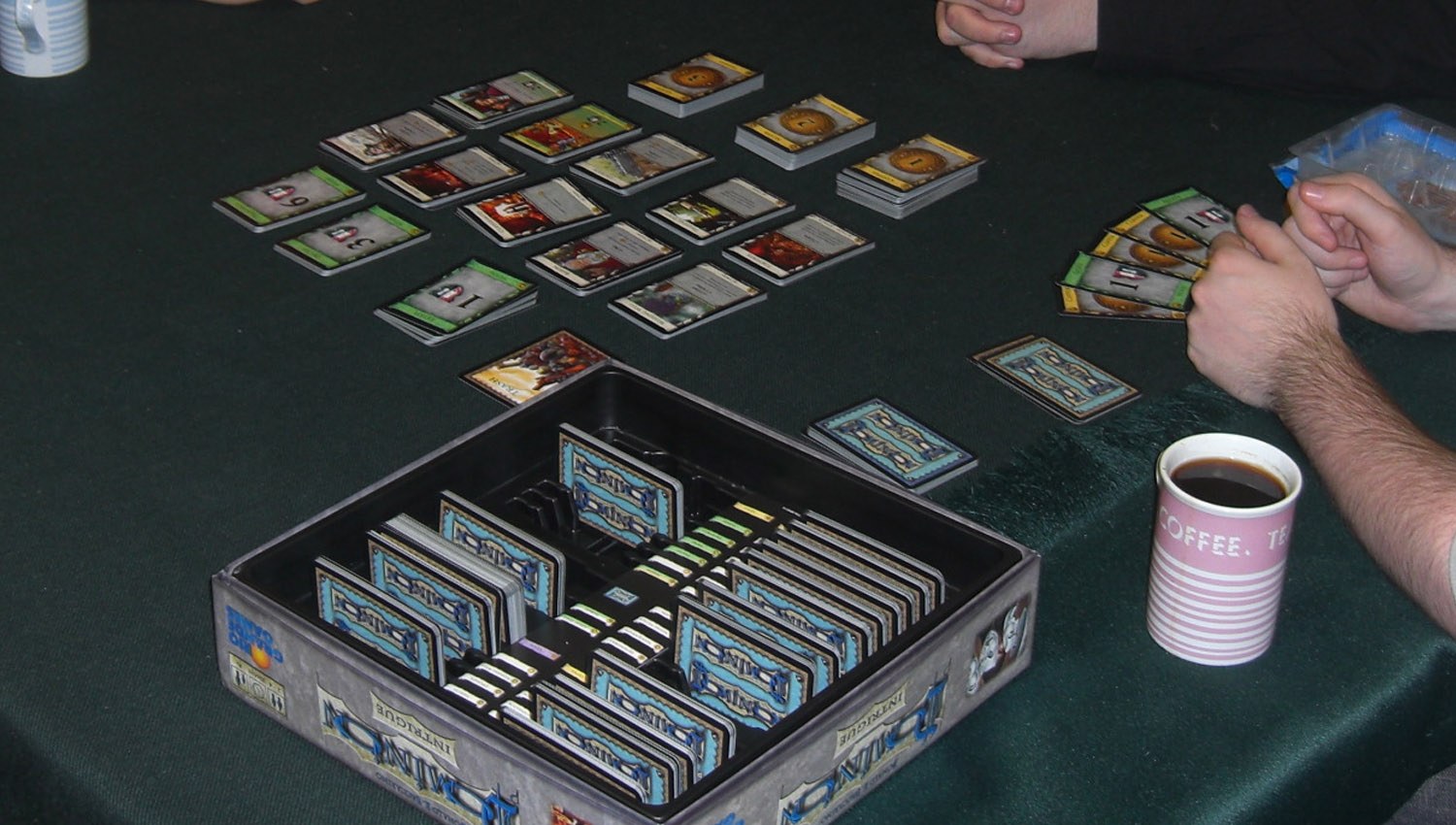
#51: DOMINION: INTRIGUE
Paul: Wait, didn’t we just do Dominion? I feel like we just talked about Dominion.
Quinns: Paul, you have to get back under those limes again.
Paul: NO.
Quinns: Lime it up, lime boy. Take me all the way to Limetown.
Paul: LOOK, it’s a COOL STANDALONE EXPANSION that introduces more actively antagonist cards, which foster more player interaction, but then I reckon if we’re already talking about Dominion anyway, we’re already factoring in that huge body of expansions that add some new dynamics, right? I don’t think we need to say any more-
Quinns: I’m not seeing enough limes here. POUR ON MORE LIMES.
You know what I’ve just realised? There must be a hundred deckbuilding games today that have built on what Dominion invented, but if I was talking to someone new to board gaming I’d still consider recommending Dominion to them. There’s something to be said for a good idea, unadulterated by storytelling and wacky ideas. Speaking of which…
What we said:
Paul: Limes.
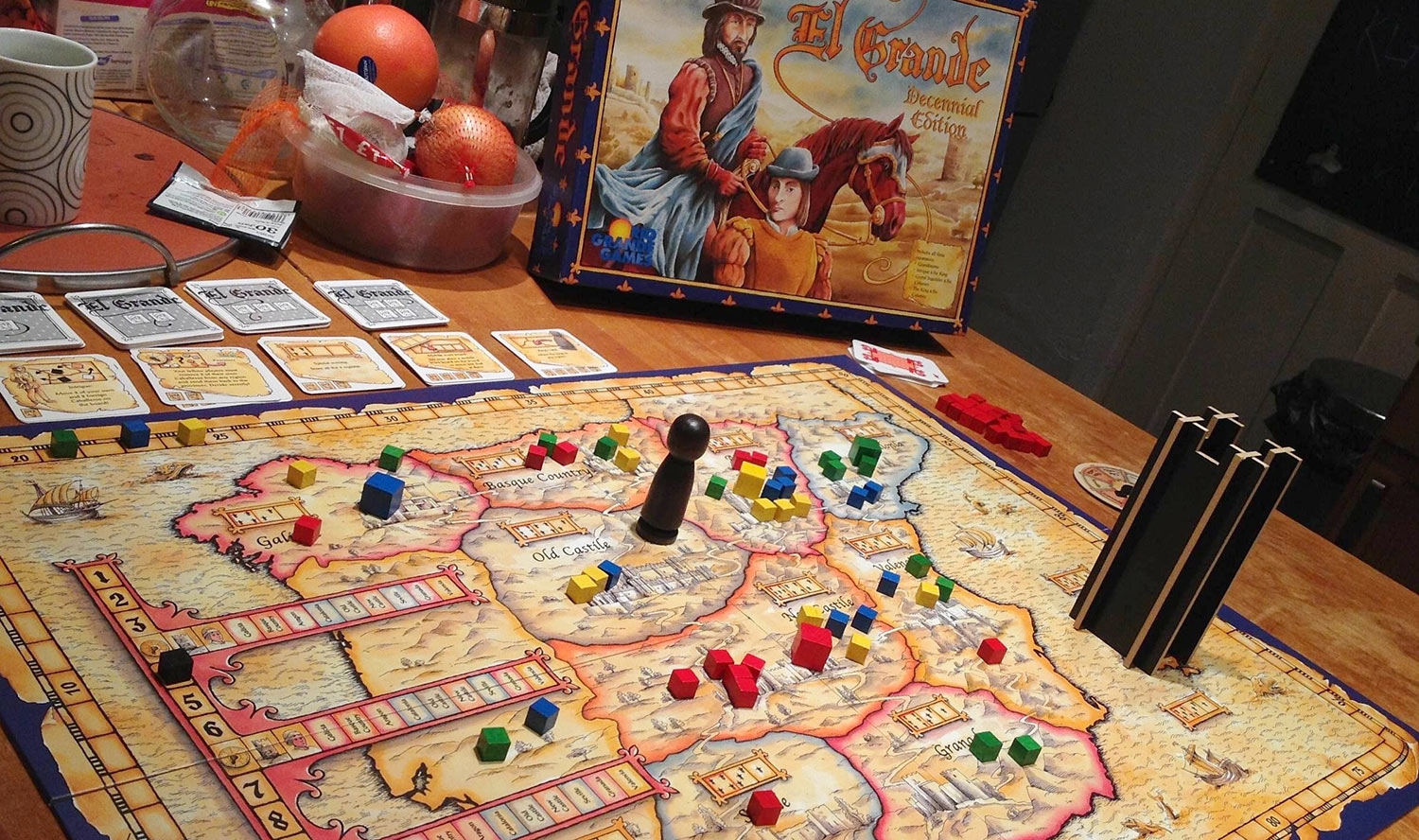
#50: EL GRANDE ![]()
Review here
Quinns: Still today when I see El Grande I’m overcome with the kind of heartswell that you get when you meet a golden retriever. What a good boy! What a good and cute boy. I want to cuddle up to the above .jpg and kiss it on its sweet yellowing face.
You can keep your copies of Rattus, Tigris & Euphrates and Twilight Struggle. El Grande is the only classic I need. Plus it comes with a free buttplug! Can you afford not to buy it?
(Erm, you probably can, yes, since it seems to be out of print at the moment.)
Paul: This is heading in directions I did not expect, so to bring things a casa, El Grande remains for me the grandaddy and Godfather of area control games. I’m not sure if anything has quite topped it.
Quinns: I couldn’t agree more.
What we said:
Paul: El Grande is a big, old, haggard and noble classic and it’s easy to see why it’s stood the test of time so well. It’s extremely strategic, and while the rules governing what you can put where are so straightforward, making the game so incredibly easy to understand, the actual decision making is a true brain-bender.
El Grande is chess-like in that you can take in the entire board with just a glance, seeing who is dominating where, seeing where you need to build up your presence. Every turn is a new attempt to outmaneuver and outnumber someone somewhere.
That said, I like it but I don’t love it and my interest shouldn’t be mistaken for passion. El Grande is such a simple, smart game, a wonderfully well-realised idea, but I do wish it had a little more to do – a few more decisions to make, more ways of interacting with the other players or swinging the balance of power. The thing is, even just talking about the game with you like this does make me want to play again.
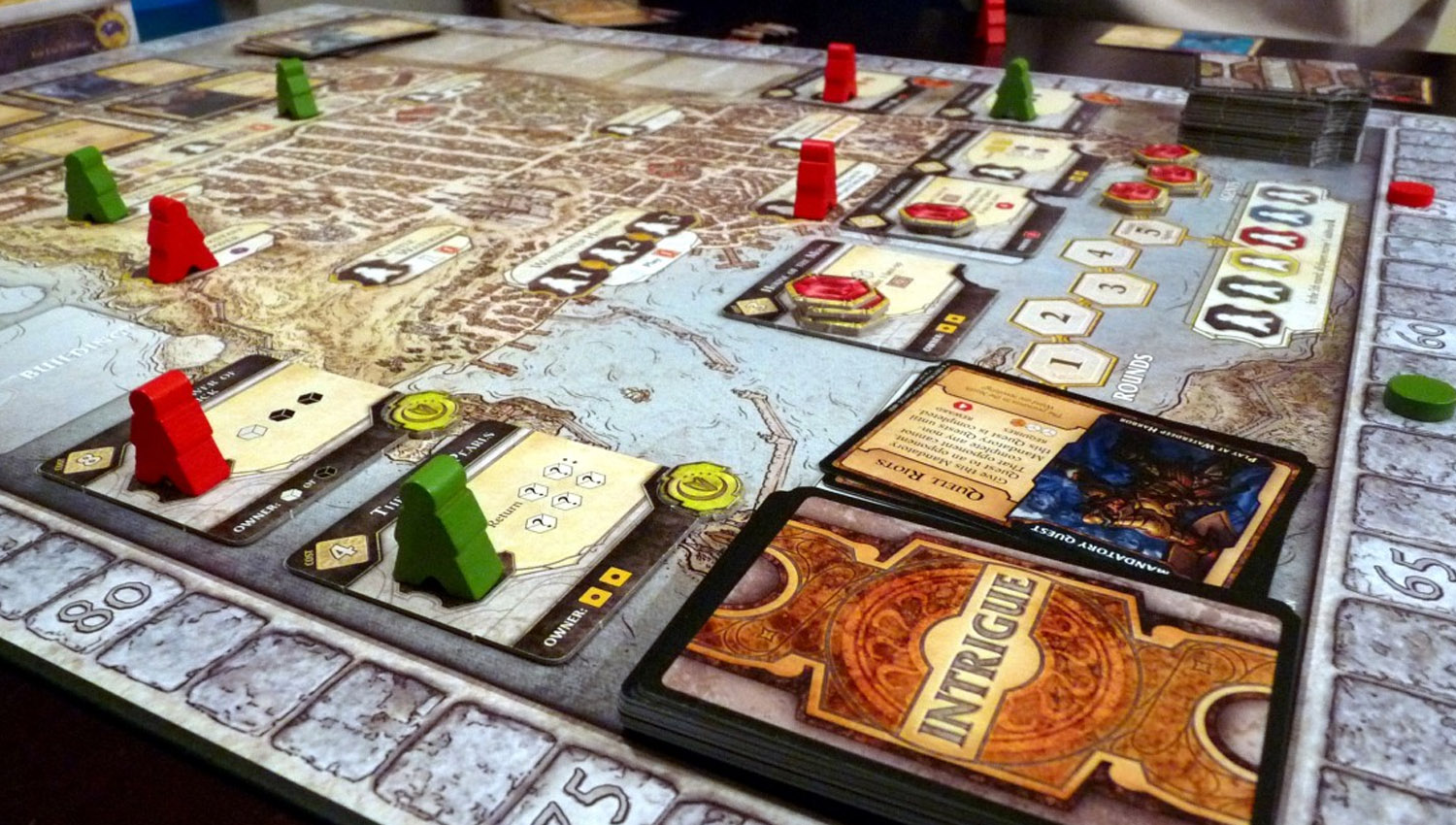
#49: LORDS OF WATERDEEP
Quinns: This D&D-themed worker placement game set the board gaming scene alight when it first came out, and today more than 29,000 Board Game Geek users have awarded it an average of 7.8 out of 10. But our coverage of Lords of Waterdeep is limited to a mention on our 6th ever podcast, where I described it sequentially as “fine,” “aggressively fine,” and “superfine,” before talking about the box inlay because I couldn’t think of what else to say.
I don’t think Lords of Waterdeep is bad, nor do I think those 29,000 people are wrong. But I think it’s fair to say that it’s an unambitious design compared to other worker placement games that came out at the same time, let alone ones that have come out since. It always felt very simple and safe to us. It felt fine. It’s fine.
…And once again, five years later, I’m at a loss for words. Let’s move on.
Paul: More like Lords of Waterderp amirite.
Quinns: You know, I think whenever one of us starts trying to be an adult, someone else becomes childish to maintain order.
Paul: This is getting orc-ward.
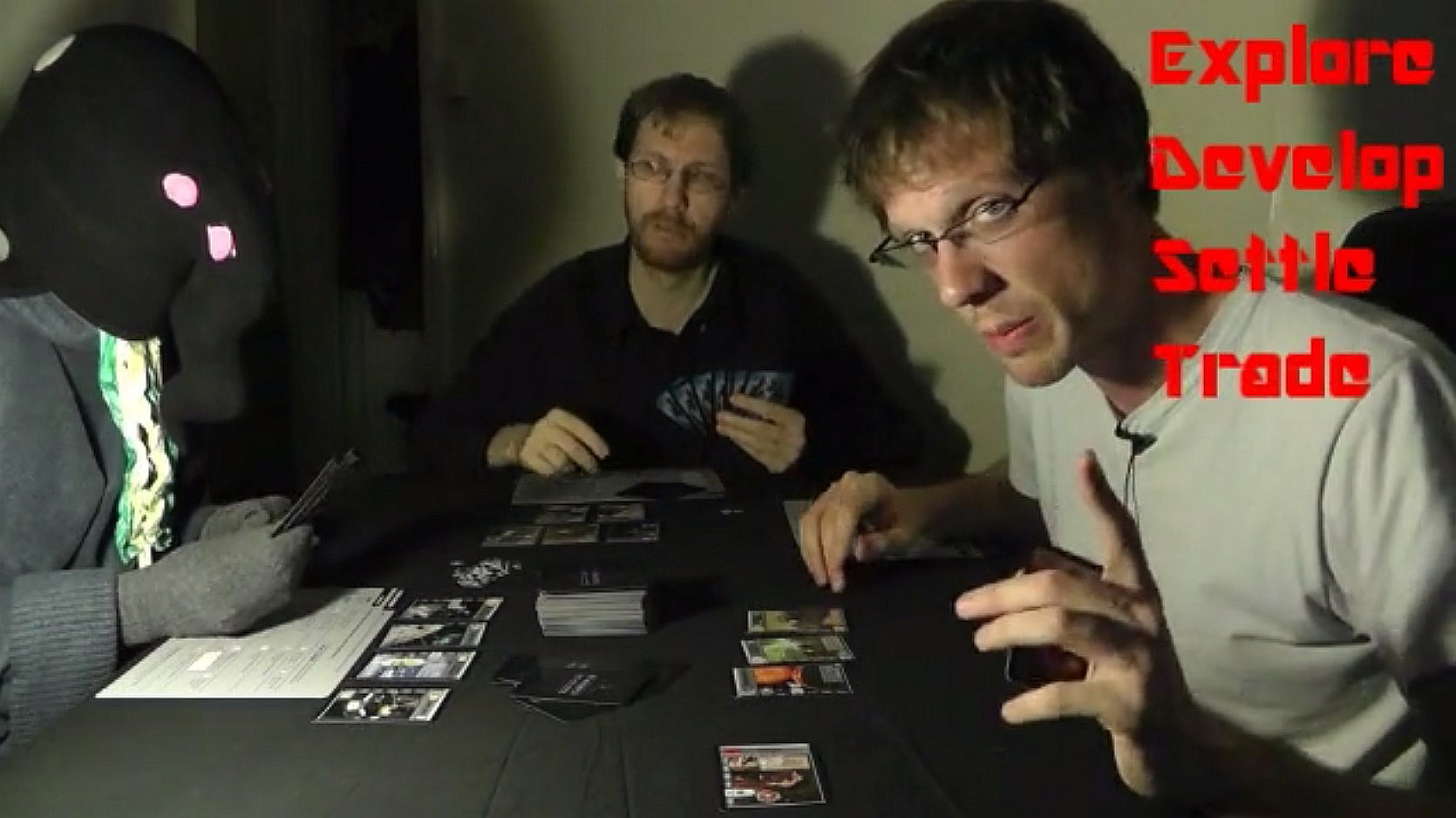
#48: RACE FOR THE GALAXY ![]()
Review here
Quinns: Right, now HERE’S a game that deserves to be in the top 50 board games ever made. I desperately want to play this again. I’ve just this week organised a new pen & paper RPG campaign, but might I have been happier arranging a Race for the Galaxy club instead? We could talk about race, play race, invent race-themed cocktails and get matching race tattoos.
Wait, that last bit came out wrong
Paul: Hot diggity is this a game that has aged with dignity. It’s the Diana Rigg of card games, all slick and savvy and so very smart. It’s fundamental mechanic will never not be challenging and, okay, I admit that some of the expansions may be better than others, but it just has so many surprises. So many wonderful cards.
Quinns: Cards depicting almost nothing but artwork, unsullied by a gigantic text box at the bottom! I didn’t appreciate that when we first reviewed this.
What we said:
Paul: People in space like tricky decisions. This game’s strength comes from how it’s extremely randomised (something I always like) and how there are so many routes to success. You can concentrate on building up your military, on expanding your trade routes or simply on mass-producing cheap galactic tat. But whatever goods you manufacture, time is a luxury you do not have.
Whenever you explore, settle, trade, whatever, you’re giving up your opponents a chance to as well. Likewise, every time you hold cards instead of playing them, you might miss an opportunity. Every time your opponent chooses to play a phase you can’t participate in, you’ve missed a trick.
Quinns: There are just so many reasons to love Race for the Galaxy. There’s how it turns one deck of cards into a universe of pitfalls and possibilities, how no two games of it could ever be the same- we said Twilight Imperium was as broad as the belt of Orion. Well, this game is a dense as the core of a star, so dense that on a complex turn you might feel like you’re drowning in options and ideas and considerations.
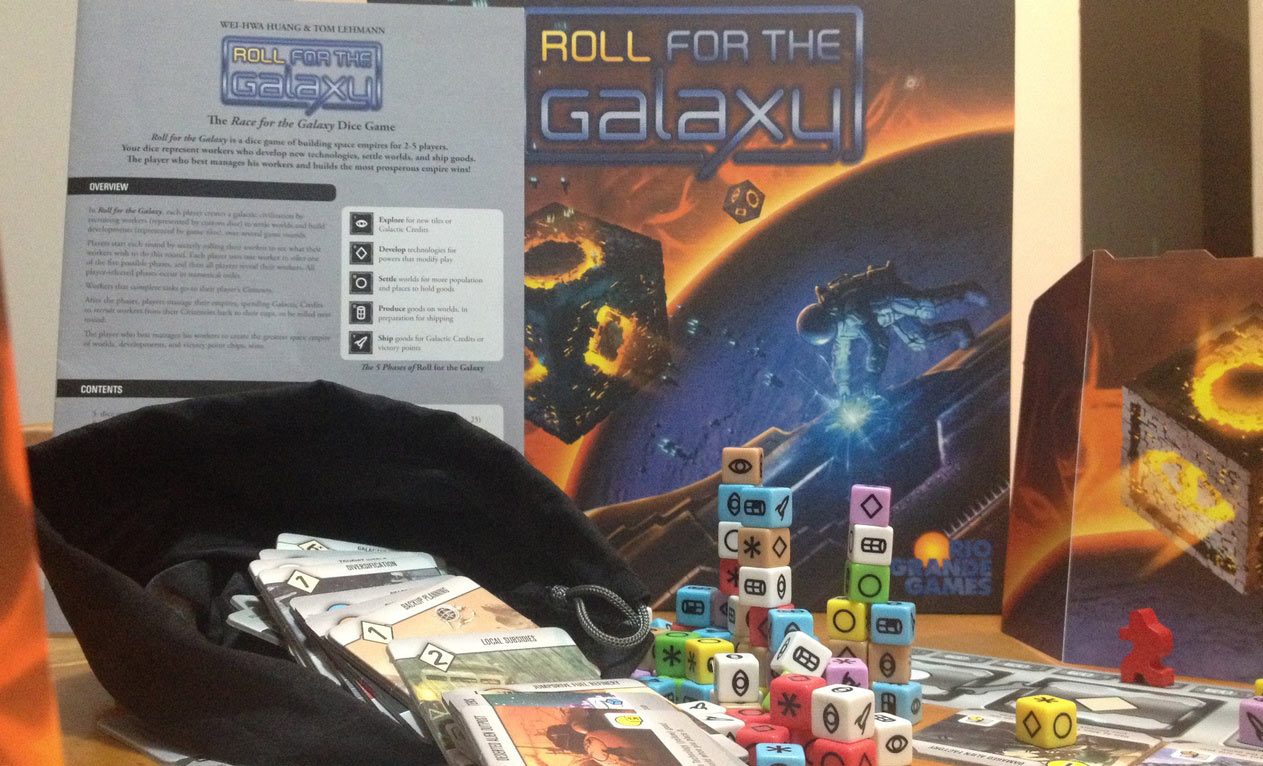
#47: ROLL FOR THE GALAXY ![]()
Review here
Quinns: As a consequence of writing this article I have (a) remembered how much I love Race for the Galaxy and (b) ordered a copy of Roll for the Galaxy and the Ambition expansion to see if Paul’s right that it’s the better game.
Paul: More like Troll for the Galaxy amirite.
Quinns: What does-
Paul: Okay, I am going to shake the foundations of the universe by saying this now, but… this shouldn’t be above Race.
Quinns: What?! But when you reviewed Roll two years ago you told me you preferred it to Race.
Paul: WELL. In hindsight, in addition to lacking Race’s scope, I think it might not have the same tightness. All of this makes me think the cosmos might be out of flux, and that there is some great galactic misalignment that must be fixed. Come now, we must go back in time to fix it!
What we said:
Paul: It’s delightful to gradually assemble your own collection [of dice], just as it was in Quarriors!. It’s delightful to build your own quirky sector of hard-working planets and watch them churn out novelty goods or alien artifacts or whatever else. It’s all delightful and I just adore Roll for the Galaxy. I really like where and how it introduces random chance. I really like how it still leaves the biggest decisions to players. I really like how it rewards careful planning but doesn’t punish you too much if you screw up, letting you throw stuff out of your build queue or simply reclaim dice if they were never used that round. I even really like its slim manual, much of which is just clarifications.
I very much recommend Roll for the Galaxy and not only do I wish I’d tried it sooner, I wish I’d tried it more and I wish we’d reviewed it sooner. That way I’d already have had more of it. More dice. More tiles. More rolling. More of the black hole bag. More. More. You’ll never cure me. Never.
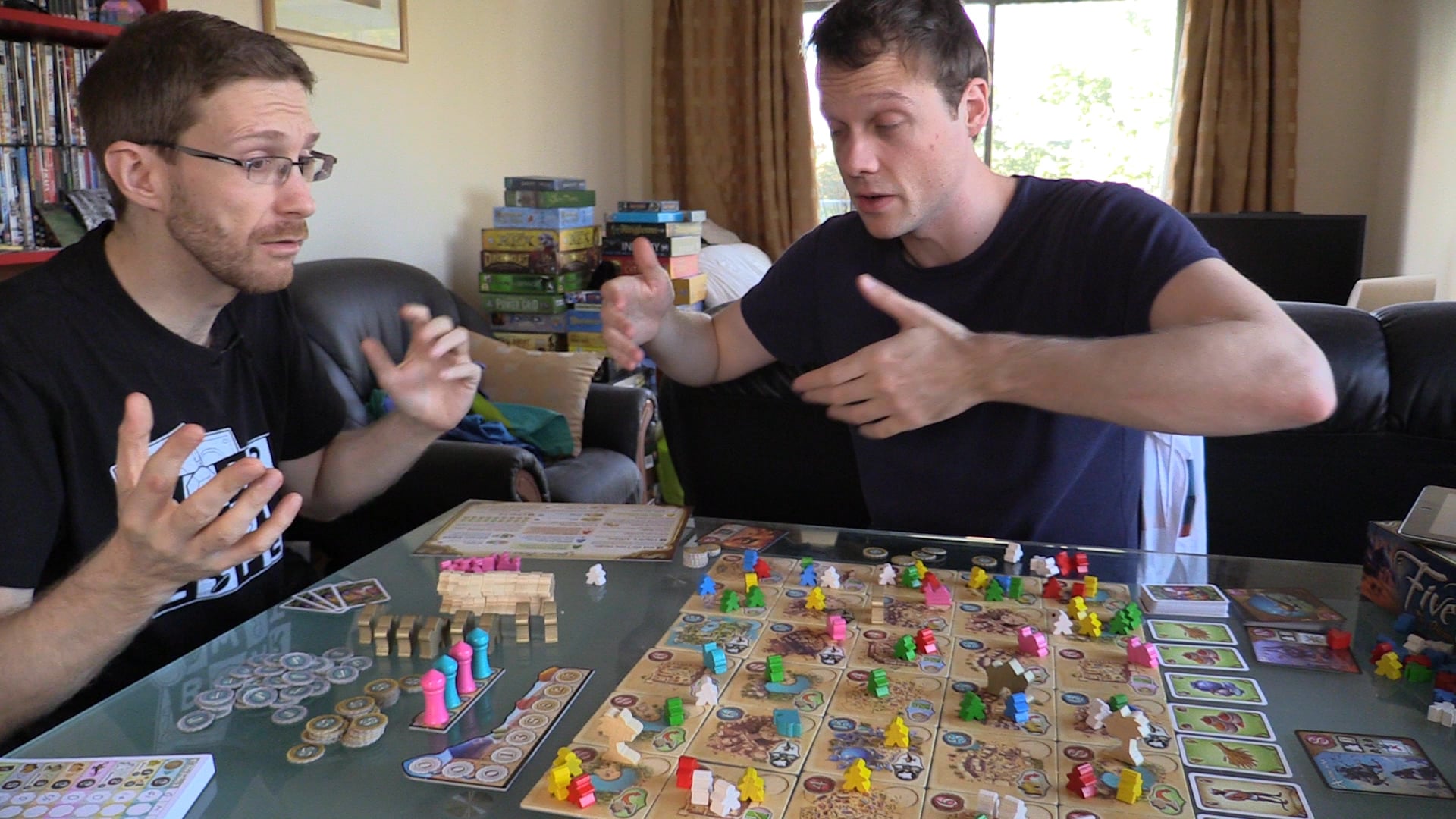
#46: FIVE TRIBES
Review here
Matt: The main thing I think about when it comes to Five Tribes are the delightfully phallic wooden towers, and the lil’ wooden houses that are actually GOLD. I really liked the idea of the mechanics behind this one, but I’ve got to say I didn’t find it massively enjoyable. Leaving a trail of meeple behind you as you hop towards the area you want to end up in is a really slick way of thinking about areas and motion, but for me it made my choices feel fuzzier and less precise – I was less invested in the choices I was making.
Quinns: Funny story- in our review I made the slightly weak defense of Five Tribes that the best way to play was to let your eyes glaze over and make the move that feels right, as opposed to calculating the best move, because the latter is an exercise in frustration.
Five Tribes designer Bruno Cathala later showed up in the comments of our review and said “Quinns is exactly right! That’s how you play!” And on reflection, that torpedoed my love for this game. If a game’s designer admits that the only way to play their complicated and expensive game is to kind of guess at what moves are good, you’re not playing something enigmatic and mysterious. You’re playing something half-baked.
What we said:
Quinns: I’d absolutely recommend Five Tribes as a beautiful box with a game the likes of which I’ve never played before. It keeps me engaged from the first second to the last and I’d play it again in a heartbeat.
Paul: Whereas I’d recommend you don’t buy Five Tribes because I pretty much hate it. I want to interact with other players more. I want something faster, less dependent on lots of recalculation, less hard. It’s hard and I don’t feel that getting some victory points is enough payoff for the thinking I do.
But sometimes we don’t agree on things. Fortunately, you, our viewer, will have your own free will and judgement. Probably granted to you by a genie.
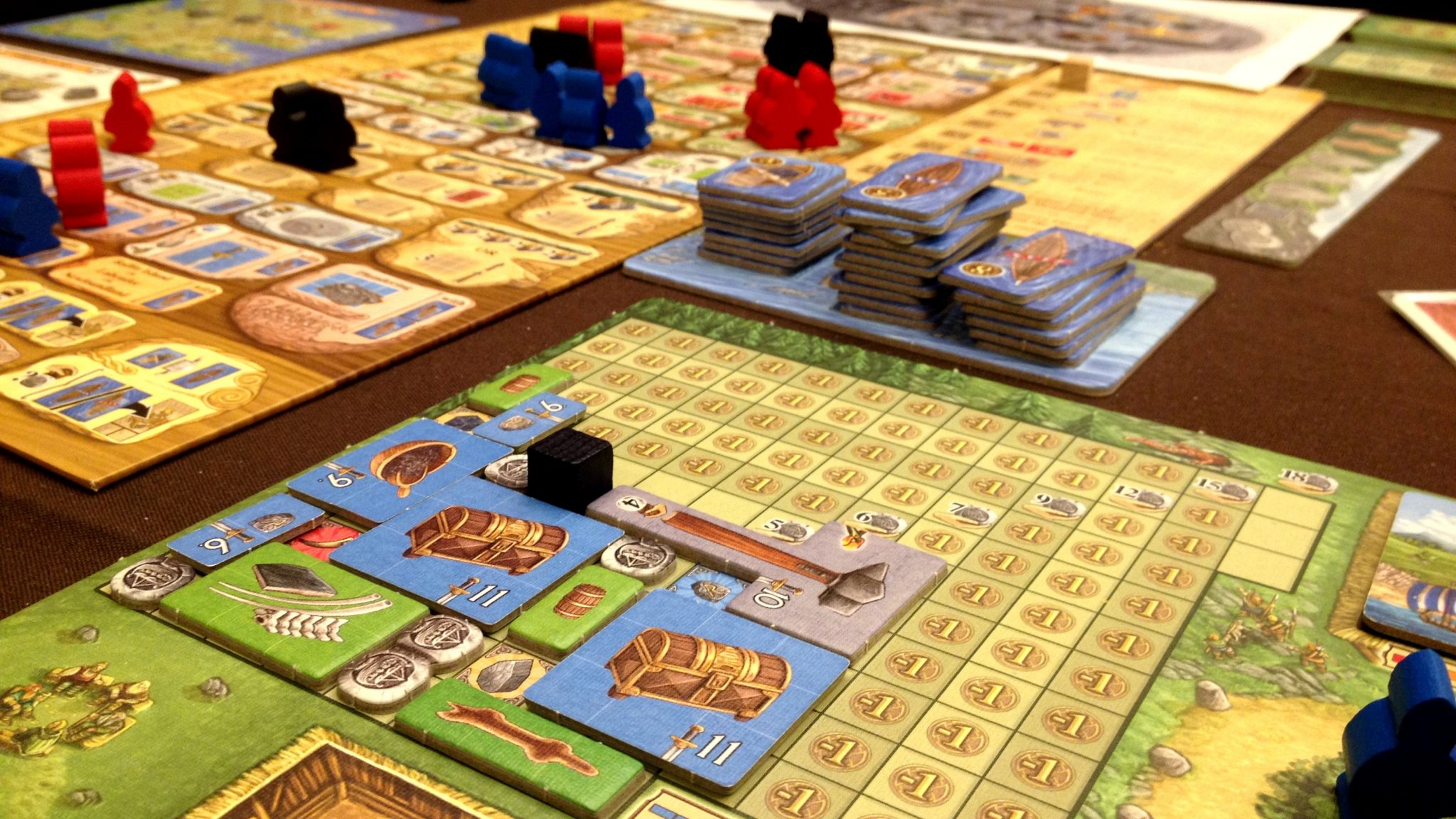
#45: A FEAST FOR ODIN ![]()
Review here
Matt: When we were at GDC this year, Paul legitimately spent the first half day just standing behind a table showing A Feast For Odin, telling anyone who would listen about the wondrous delights of “Odin’in it up Real Style in the USA”. This isn’t even a joke or even a statement about the game, I just remember thinking oh wow, Paul sure seems to be telling everyone about this game in the fashion of some sort of Cardboard Mormon. This is the point where he should probably pop in and tell you all what it’s like.
Paul: I don’t remember any of this. I remember being scared that I’d lose a stoat pelt or a bit of whale bone in California. Also, I remember just absolutely adoring the Viking Tetris part of this game so much. Damn. We should’ve squeezed out a game while we were there. You’d have loved it, I promise!
What we said:
Paul: For me now, A Feast for Odin does that [Agricola and Caverna] thing better. I think it’s more accessible. I think it’s faster, it’s tighter… It is the ultimate evolution of the Rosenberg Pokémon.
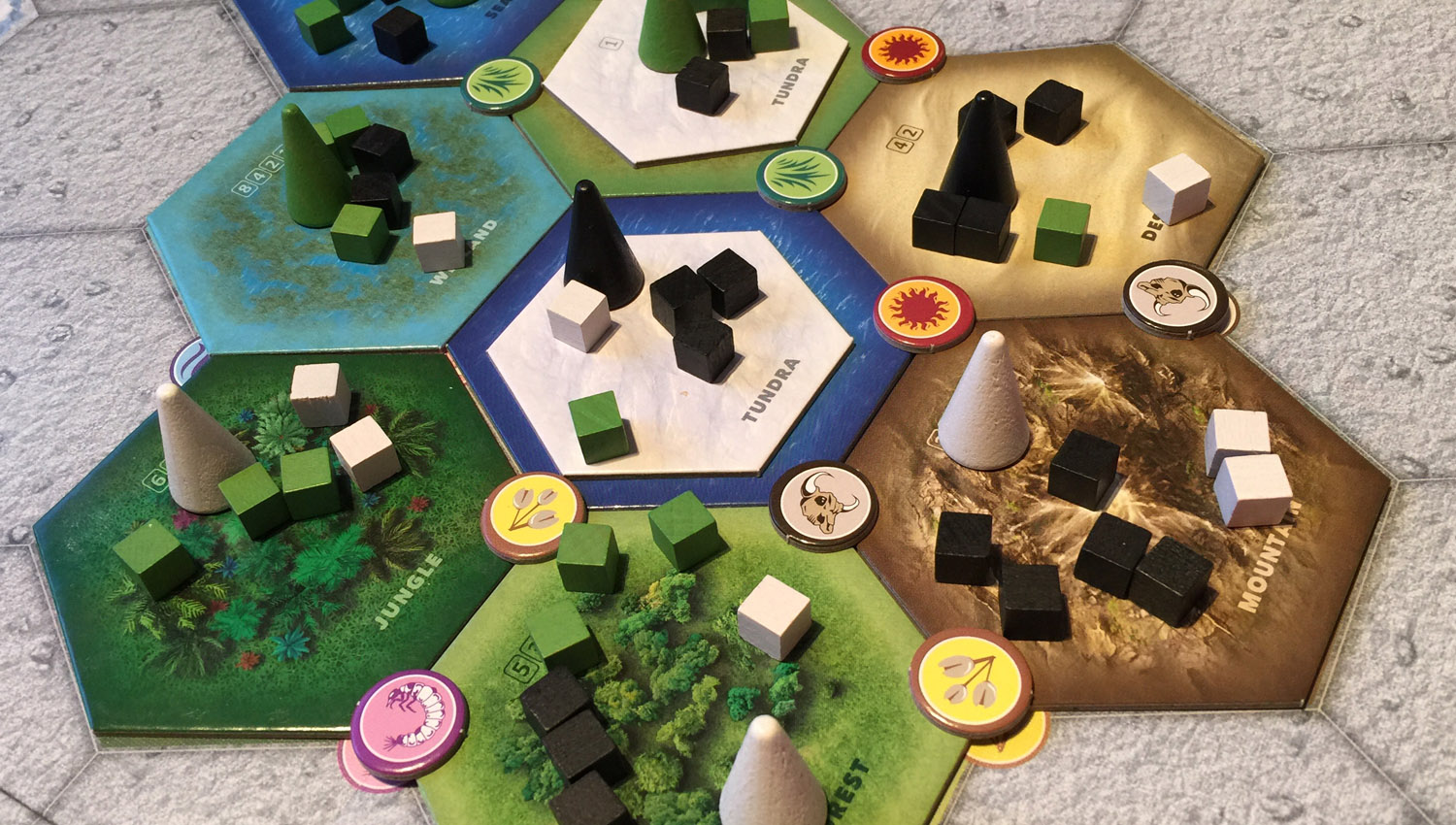
#44: DOMINANT SPECIES
Talked about in a podcast for sure
Quinns: There’s currently no review of Dominant Species on SU&SD, but Paul and I have indeed played this wargame / evolution simulator / visual inspiration for The Cones of Dunshire.
Everyone’s right. Survival of the fittest makes for a profoundly strategic game! But Dominant Species is also an incredibly expensive box, it’s hideous to look at and a bear of a game to learn. Unless you’re psyched about the theme of evolution, we think that makes this game as appealing as a jet-black banana.
“Ha! But last turn I evolved my reptiles to be able to eat black bananas!” you cry.
“I don’t care!” I shout, sealing myself in the little cupboard under the stairs. It is safe here, and there is nothing called a Glaciation Phase where I can gain victory points for placing a tundra tile equal to the number of adjacent tundra tiles. There are only spiders, and some assorted cleaning supplies.
“Hello Mr. Spider!” I say.
“LAST TURN,” shouts the spider, “YOU FORGOT TO REMOVE ELEMENT DISCS DURING THE DEPLETION PHASE.”
“You like Dominant Species?!” I cry. “What a twist!”
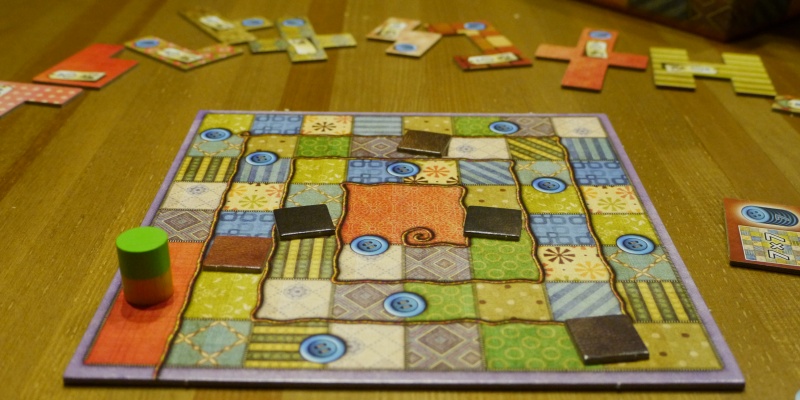
#43: PATCHWORK ![]()
Review here
Paul: While I might not say that this is one of the very best two player games around, I’d definitely say it’s one of the most accessible and most perfectly formed. Patchwork is one of those small games that (rather like Love Letter) takes just a few moments to learn but then lets you loose to be as conniving and as coy as you can manage. It’s also such an unusual and yet immediately approachable concept for a board game, which makes it a great ambassador for the hobby and an ideal hook for a lot of those people who are nervous about dipping their toes into these wonderful waters.
What we said:
Paul: It’s such a tight, precise and finely chiselled design, a bonsai of a game that has been expertly sculpted so that everything you do, from turn to turn, is intimately connected to everything else, has a direct and immediate impact on both you and your opponent. At the same time, this isn’t a game that demands chess-like foresight or calculation, since your position is always changing. Instead, you need to be adaptable, as that wee token skips around an ever-decreasing spiral of fabric pieces, it constantly presents new situations and new opportunities. This also means it’s difficult to really dig yourself into a hole, to find your mistakes have pushed you into an inescapable corner. Patchwork isn’t easy, but it is at least forgiving.
Oh, and I suppose it’s also an abstract puzzle game that will only entertain two players. That, immediately, is going to turn some of you off. I want to say that I thoroughly, thoroughly recommend you buy or at the very least try Patchwork, but maybe you already know it’s just not for you, eh? Eh?
Still, it’s a wonderful duel of constant puzzling that, while it plays nothing like Love Letter, kept reminding me of that game’s distilled design. It’s so quick (games can be just fifteen minutes), it’s so smart, it’s so easy to learn and yet it’s so hard to master.
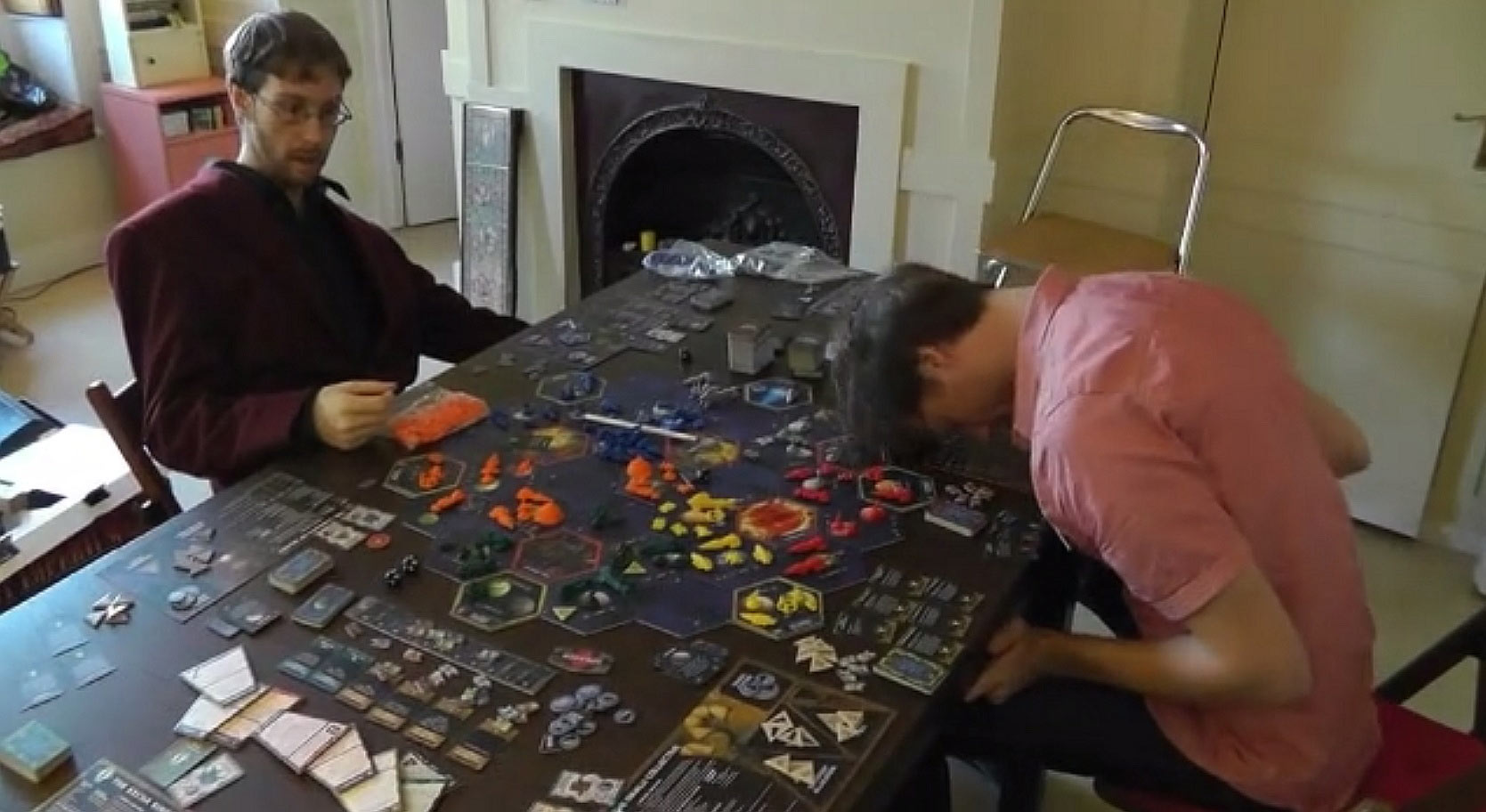
#42: TWILIGHT IMPERIUM (THIRD EDITION) ![]()
Review here and our playthrough here
Matt: I still can’t get over how big this game is. You need a note from your doctor to get the right kind of table. Still though, I think what surprises me most about Twilight Imperium is that it isn’t actually a complicated game. After years of hearing the name murmured with terrified reverence, I only recently discovered that the only reason it takes forever to finish is because it’s a wormhole to an infinite universe of bluster. I WILL DESTROY YOU, WORM. Probably. Possibly? Probably not no, let’s be friends, WORM.
Paul: IT’S MIGHTY. And usually I might be skittish around a game of this size, worried about how accessible or overwrought it might be, but Twilight Imperium (mostly) avoids getting too complicated and offers concepts that are exciting and relatable, concepts like huge spaceships and interstellar grudges. It’s still intimidatingly long and not to be sniffed at (don’t you DARE sniff at this game), but most of its rules really aren’t so bad.
Quinns: I think it’s just nice for us as critics when we have games that are unquestionably best-in-class at something. Do you want a colourful space opera with councillors, dreadnaughts and dozens of wacky alien races? Buy Twilight Imperium. Done. Bosh.
What we said:
Quinns: If you want a bombastic experience, something that’ll tell a story… not a story, an epic! A tangible epic on your dining room table, with all the sky-swallowing colour of a rainbow… this is it.
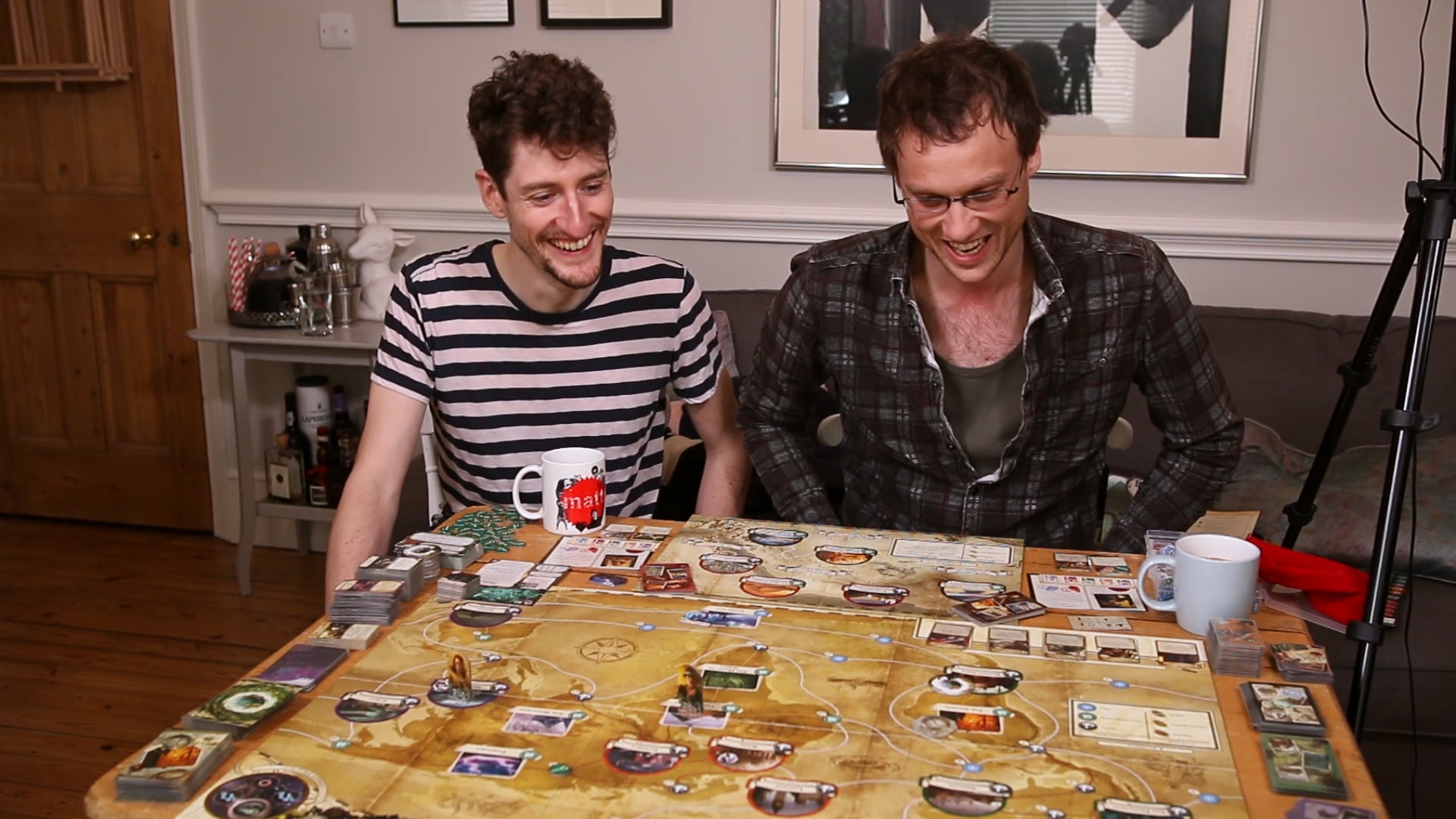
#41: ELDRITCH HORROR
Review here and our playthrough here
Matt: Having only played this once – and in the setting of a Let’s Play – far from ideal! – I only got half a sense of what it was like. I think we went to Egypt and then I found a shotgun and everything was OK? I can see why the rest of team SU&SD haven’t been hot on the Horror games in the past, without solid structure to tie your adventure together it’s both mechanically and thematically a bit too much like bingo. Except instead of balls, you pull out… ghouls? That’s probably for the best, all things considered.
Quinns: Yeah, I think Arkham Horror: The Card Game has shown a little bit of what we always felt was missing from Eldritch Horror (and Arkham Horror). It’s not that we have a problem with the schlocky, dynamite-toting battle-against-interdimensional-thingums tonality that these games offer. It’s that we at least need the story they’re telling to make sense and have structure. And when you want a game that can tell ANY sort of story, as Eldritch Horror promises to, all too often it tells no kind of recognisable story at all.
Matt: True – although to be fair the LCG suffers from that almost as badly when zoomed out and viewed as one story arc, but there’s a thin line between chaos and chaff that largely it just about manages to walk.
What we said:
Quinns: So, should you buy Eldritch Horror? Well, it’s obviously a hell of a thing. Sprawling, yet thin. Gorgeous, yet awkward. It’s up to you whether you’ll notice or care about the flaws in its puzzle and with its storytelling, or whether you’ll accept it into your home like a warped and misshapen cardboard baby. Just how much do you love Lovecraft?
SU&SD Takes on the BGG Top 100
100 – 8180 – 6160 – 4140 – 2120 – 1110 – 1

